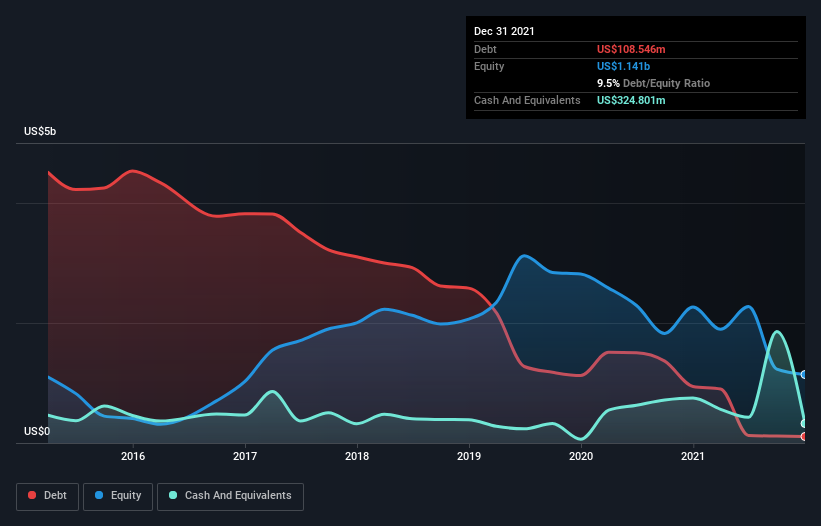Is Laureate Education (NASDAQ:LAUR) Using Too Much Debt?
Howard Marks put it nicely when he said that, rather than worrying about share price volatility, 'The possibility of permanent loss is the risk I worry about... and every practical investor I know worries about.' It's only natural to consider a company's balance sheet when you examine how risky it is, since debt is often involved when a business collapses. As with many other companies Laureate Education, Inc. (NASDAQ:LAUR) makes use of debt. But the real question is whether this debt is making the company risky.
Why Does Debt Bring Risk?
Debt and other liabilities become risky for a business when it cannot easily fulfill those obligations, either with free cash flow or by raising capital at an attractive price. Part and parcel of capitalism is the process of 'creative destruction' where failed businesses are mercilessly liquidated by their bankers. However, a more frequent (but still costly) occurrence is where a company must issue shares at bargain-basement prices, permanently diluting shareholders, just to shore up its balance sheet. Of course, debt can be an important tool in businesses, particularly capital heavy businesses. When we think about a company's use of debt, we first look at cash and debt together.
Check out our latest analysis for Laureate Education
What Is Laureate Education's Debt?
The image below, which you can click on for greater detail, shows that Laureate Education had debt of US$108.5m at the end of December 2021, a reduction from US$943.1m over a year. However, its balance sheet shows it holds US$324.8m in cash, so it actually has US$216.3m net cash.
How Strong Is Laureate Education's Balance Sheet?
We can see from the most recent balance sheet that Laureate Education had liabilities of US$371.9m falling due within a year, and liabilities of US$698.1m due beyond that. On the other hand, it had cash of US$324.8m and US$182.5m worth of receivables due within a year. So it has liabilities totalling US$562.8m more than its cash and near-term receivables, combined.
This deficit isn't so bad because Laureate Education is worth US$2.18b, and thus could probably raise enough capital to shore up its balance sheet, if the need arose. But it's clear that we should definitely closely examine whether it can manage its debt without dilution. Despite its noteworthy liabilities, Laureate Education boasts net cash, so it's fair to say it does not have a heavy debt load!
Also relevant is that Laureate Education has grown its EBIT by a very respectable 28% in the last year, thus enhancing its ability to pay down debt. There's no doubt that we learn most about debt from the balance sheet. But ultimately the future profitability of the business will decide if Laureate Education can strengthen its balance sheet over time. So if you want to see what the professionals think, you might find this free report on analyst profit forecasts to be interesting.
Finally, while the tax-man may adore accounting profits, lenders only accept cold hard cash. While Laureate Education has net cash on its balance sheet, it's still worth taking a look at its ability to convert earnings before interest and tax (EBIT) to free cash flow, to help us understand how quickly it is building (or eroding) that cash balance. Looking at the most recent three years, Laureate Education recorded free cash flow of 44% of its EBIT, which is weaker than we'd expect. That's not great, when it comes to paying down debt.
Summing up
Although Laureate Education's balance sheet isn't particularly strong, due to the total liabilities, it is clearly positive to see that it has net cash of US$216.3m. And it impressed us with its EBIT growth of 28% over the last year. So we are not troubled with Laureate Education's debt use. Even though Laureate Education lost money on the bottom line, its positive EBIT suggests the business itself has potential. So you might want to check out how earnings have been trending over the last few years.
At the end of the day, it's often better to focus on companies that are free from net debt. You can access our special list of such companies (all with a track record of profit growth). It's free.
Have feedback on this article? Concerned about the content? Get in touch with us directly. Alternatively, email editorial-team (at) simplywallst.com.
This article by Simply Wall St is general in nature. We provide commentary based on historical data and analyst forecasts only using an unbiased methodology and our articles are not intended to be financial advice. It does not constitute a recommendation to buy or sell any stock, and does not take account of your objectives, or your financial situation. We aim to bring you long-term focused analysis driven by fundamental data. Note that our analysis may not factor in the latest price-sensitive company announcements or qualitative material. Simply Wall St has no position in any stocks mentioned.


